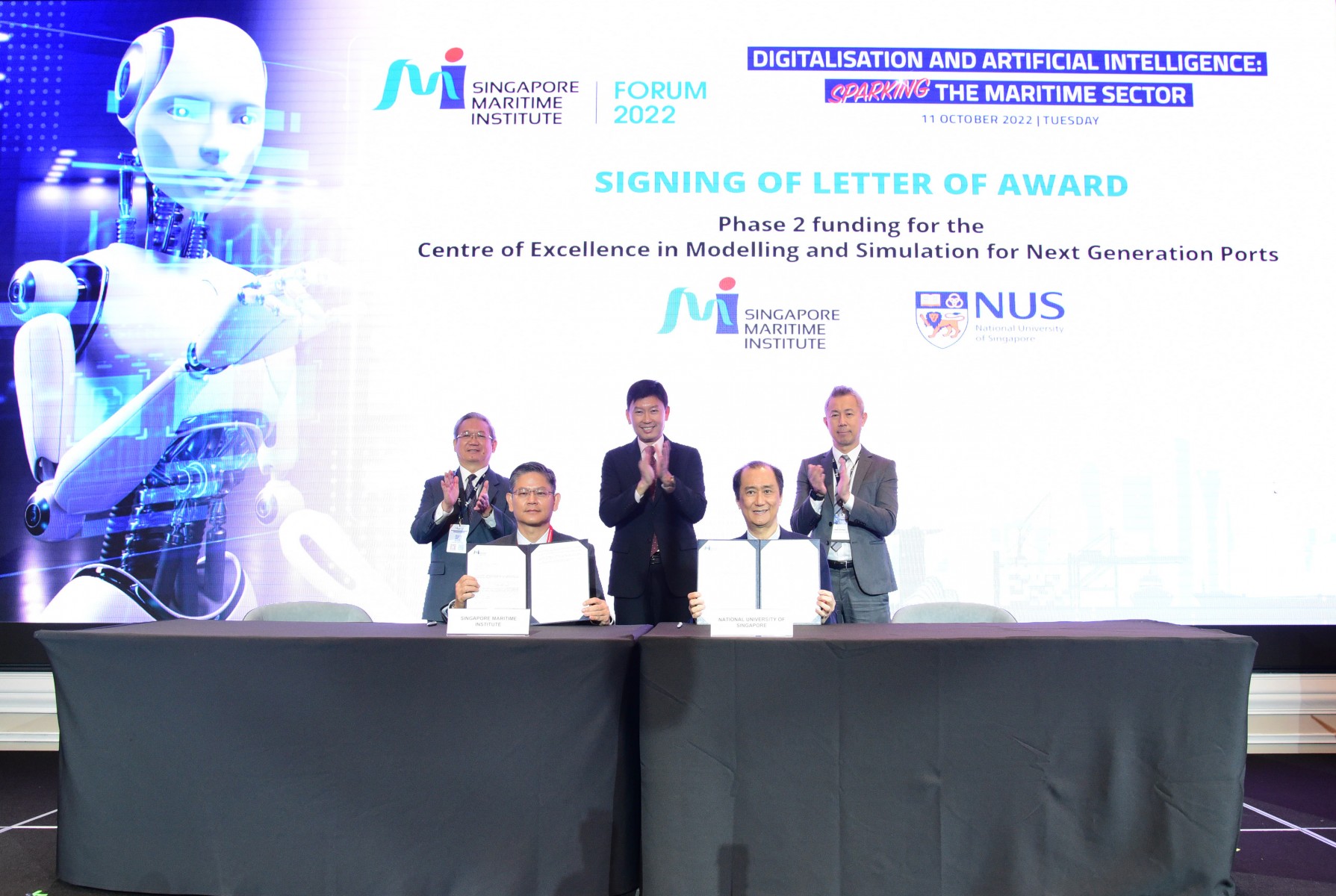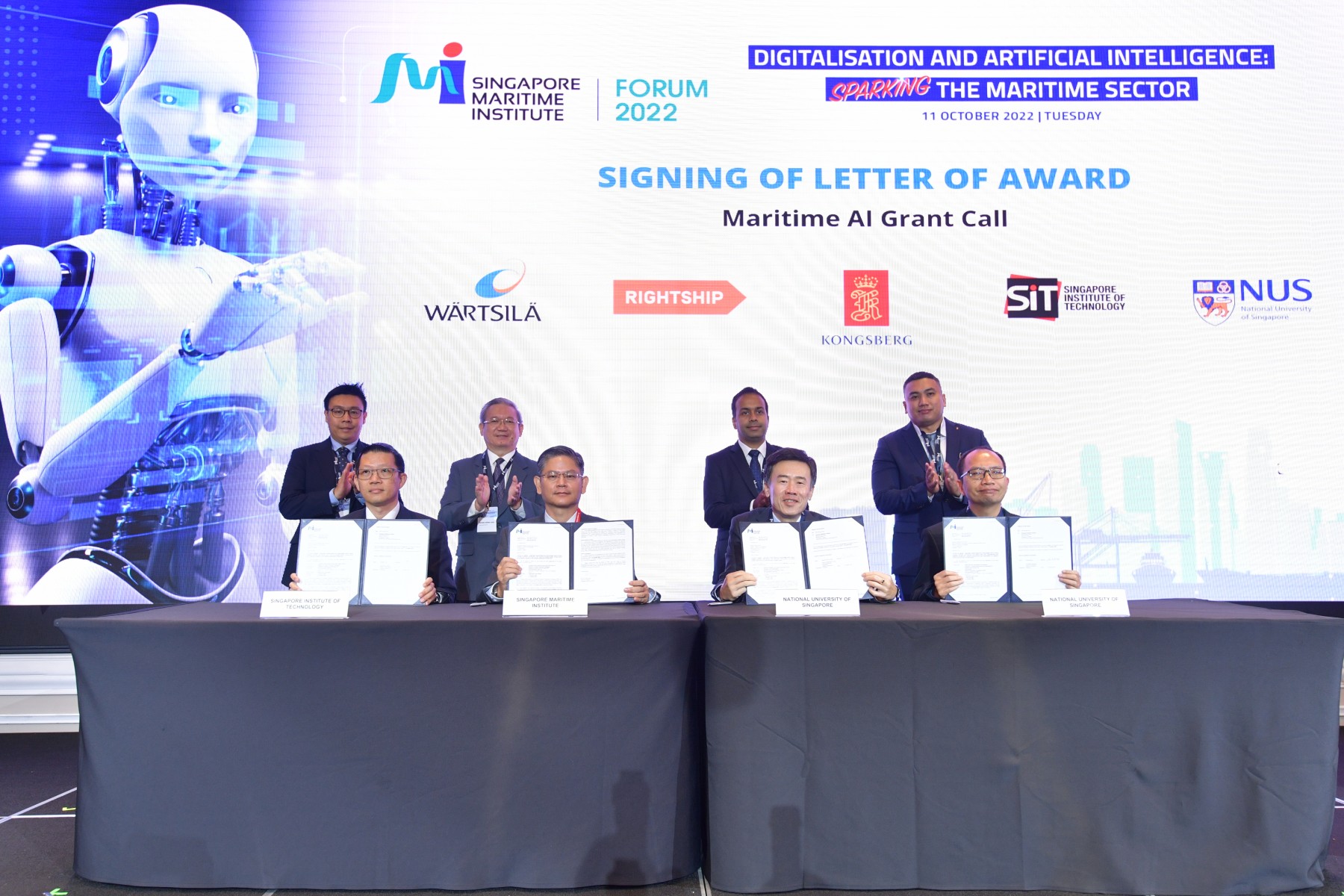NUS receives close to S$13 million in research funding to develop smart capabilities for next-generation ports
New funding will accelerate industry adoption of smart digital twin technologies for ports and harness artificial intelligence for maritime applications
Researchers from the National University of Singapore (NUS) have been awarded research funding totalling close to S$13 million to develop cutting-edge technologies and systems to boost maritime operations in Singapore. These initiatives were announced at the Singapore Maritime Institute (SMI) Forum 2022 on 11 October 2022.
The Centre of Excellence in Modelling and Simulation for Next Generation Ports (C4NGP), which is part of NUS College of Design and Engineering (NUS CDE), will receive S$10 million in funding over five years from SMI to embark on Phase 2 of its research goals of developing advanced modelling, simulation and optimisation capabilities for next generation ports and maritime systems. Its key priority will be to translate the Centre’s advanced digital twinning technologies for adoption by local port and maritime related industries.
C4NGP was first established in 2018 by NUS and SMI. The first phase involved an investment of S$18 million for the Centre to conduct research in four key areas: Next Generation Virtual Port Platform; Next Generation Sea-Port Interface Systems; Next Generation Port Systems; and Next Generation Port-Land Interface Systems.
To mark the continuation of the successful partnership between NUS and SMI, an agreement was signed by Professor Chan Eng Soon, Director of Research Administration at the NUS Office of the Deputy President (Research and Technology), and Mr Tan Cheng Peng, Executive Director of SMI, at the SMI Forum 2022. The signing ceremony was witnessed by Senior Minister of State for Transport and Finance Mr Chee Hong Tat.
In the next five years, C4NGP aims to deepen its research capabilities and translate its smart digital twinning technologies developed in Phase 1 for industry adoption. Some of the Centre’s upcoming R&D projects will include the development of the digital twin for Tuas Mega Port, advanced port operation planning systems for PSA and Jurong Port, performance analysis of future automation systems for PSA and Jurong Port, and digital twin for haulier service in Singapore.
The Centre will also establish stronger alliances and collaborations with the industry to expand its domain expertise and raise the global stature of its work. In addition, the Centre aims to grow its pool of research and development talent and nurture future practitioners with knowledge in modelling, simulation, optimisation and analytics for next generation ports. C4NGP will also organise international conferences and symposiums in port and maritime research to promote a robust exchange of ideas in the field.
Professor Chew Ek Peng, Director of C4NGP, said, “In Phase 1, C4NGP has successfully developed key enabling technologies and systems for port digitalisation in design, planning and operations. In the next five years, we will deepen our port digital twin capabilities to enable data driven and AI modelling to tackle real-time operations challenges, and translate our research outcomes into innovative solutions to help companies in the maritime industry improve their operations and enhance their global competitiveness. In addition, C4NGP will also play an active role in building a vibrant ecosystem to spur innovation, talent development, foster industry partnerships, and strengthen technology transfer in the maritime sector.”
Mr Tan Cheng Peng, Executive Director of SMI, said, “SMI is pleased to award funding for C4NGP’s Phase 2 over the next five year period. C4NGP will further develop their R&D capabilities, including their Centre’s advanced port digital twinning technologies in support of Singapore’s future fully automated Tuas Mega Port. SMI will also work with C4NGP to actively engage the industry and translate their research outcomes into meaningful solutions for the industry.”
AI solutions for the maritime industry
Two NUS research teams have also been awarded research grants by SMI and Maritime and Port Authority of Singapore (MPA) to develop artificial intelligence (AI)-based solutions to enhance maritime operations.
A team led by Presidential Young Professor You Yang from the Department of Computer Science at NUS Computing and Professor Meng Qiang from the Department of Civil and Environmental Engineering at NUS CDE will work with industry collaborator, Kongsberg Digital, to use AI for estimation of ship fuel consumption and emission.
The International Maritime Organization and various governments have recently adopted several restrictions and control policies on ship emissions. Ship operators and owners thus need to deploy energy-saving technologies and devices for reducing ship emissions and fulfilling emission control requirements. To facilitate the investment and management of energy-saving devices, it is crucial to accurately estimate fuel consumption or emission before and after installing energy-saving devices. Addressing this industry need, the NUS team will be developing AI-based approaches to predict ship fuel consumption and emission, and propose evaluation methodologies for ship energy-saving devices and technologies.
The research team has been awarded approximately S$1.18 million in funding to implement this two-year project, which will provide valuable managerial insights on ship energy-saving devices for stakeholders in the maritime sector.
Another team led by Prof Meng will collaborate with the Institute of High Performance Computing under the Agency for Science, Technology and Research and RightShip, the world's largest third party maritime due diligence organisation, to develop an AI tool for estimation and classification of vessel risk.
A significant increase in shipping demand in recent decades has resulted in greater traffic activities and flows, as well as shipping incidents involving environmental pollution, economic loss and human casualties. To enhance maritime safety and to better support industry stakeholders in their decision-making, Prof Meng and his research team aims to develop an effective and efficient method for assessing vessel risk profile.
This two-year project aims to develop a multi-source data fusion approach to establish a comprehensive vessel risk dataset, covering information about vessel accident history, vessel trajectory, port state control inspection information, and more. Based on the multi-source dataset generated, an AI-based vessel assessment method will be developed to determine vessel-based risk level score or rating, to capture complex interactions and hidden patterns among various vessel risk influential factors.
The project, which will receive approximately S$1.43 million in funding, will benefit the maritime industry and Singapore by assisting stakeholders such as charterers, ship owners and managers, ports and terminals, and insurers to understand the risk profile of each vessel, enabling them to make informed commercial decisions and mitigate maritime accident losses.




